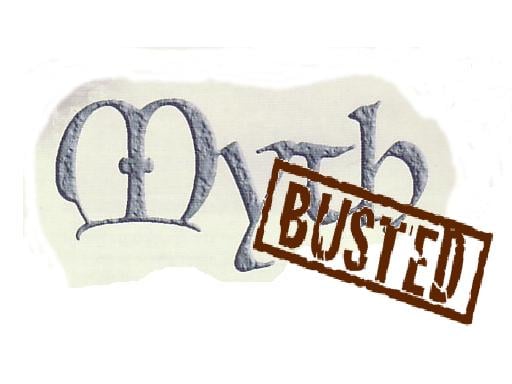
Nothing gets business and technology folk fired up like the cloud. Some are ardent in their support of cloud-based systems, while others violently oppose it with all the fervour of the religious zealot. Like philosophy, veganism and the existence of a god, cloud technology is a topic that divides people.
Yet, despite such steadfast opinions, many consumers are still fuzzy on exactly what the cloud is. A recent Webfusion survey polled 1000 people about the cloud, and revealed that 38% had little to no understanding of the term, and many didn't realise that they used cloud services every day.
Even in the business world – where cloud services are really coming into their own – understanding of the cloud isn't perfect. There's still a lot of misinformation about the cloud and what it can – and cannot – do. In this article, I get all Mythbusters on the cloud and attempt to dispel some of the most common myths about cloud-based services.
Myth #1: Cloud Computing is a Fad
"Bah. I'm not interested in hearing about "the cloud". It's a fad. I'm not going to base my business decisions on something before it's been firmly established."
Myth – BUSTED

The cloud isn't actually that new. The concept has been around for years – it's just that, until recently, the infrastructure hasn't been there to make it successful on a large scale. Some of the biggest software companies in the world – such as Adobe and Microsoft – are switching to cloud-based services. Surely, if anything, that's a sign that the cloud is now thoroughly mainstream.
The cloud isn't a fad – it's proven to have longevity. A recent study by Cloudability shows that 86% of companies currently use more than one type of cloud service. The cloud is used in many of our most beloved apps and websites, from Facebook to Amazon to Reddit. If these multi-million dollar companies trust the cloud to deliver their services in a timely, secure fashion, then surely, you should at least consider its potential?
Myth #2: The Cloud is not Secure
"I'd never store my data in the cloud. Just anybody could hack into the cloud system and steal it. I mean, look at Facebook – even with security settings you can't stop people seeing your profile if they're really determined. I've got lots of confidential client data – it's too sensitive to be stored on the cloud."
Myth – BUSTED

Security concerns are one of the biggest roadblocks to businesses adopting cloud-based technology. And it's true that cloud-based systems such as Dropbox and Gmail have been hacked in the past. But when thinking about cloud security, bear in mind these factors:
- Most of the well-known cases of security breaches in cloud-based systems have been on consumer products (such as Gmail), and have been dealt with quickly and thoroughly. After an employee's account was hacked in 2012, Dropbox started offering two-factor authentication and distributing information about encrypting files and using better passwords.
- Like any product designed for business, the majority of enterprise cloud products employ intense security systems – firewalls, proxies, data encryption, etc. These security systems go above and beyond what can be provided by a typical small business. For example, Xero has invested heavily in security infrastructure and has never been breached. Check out the Xero security information – could your business provide the same level of protection?
- Because of the sheer amount of data stored on cloud servers, even if a hacker did get past the security, it's then very difficult for them to find your specific company's files and copy or damage them. It's much easier for a disgruntled employee to get into a company's local server, knowing exactly what they're looking for.
- Don't make the assumption that data stored in hard-copy files or on a local server is any less secure. People can break in to your business, hack your email addresses, and a local server can be hacked in a similar way to cloud software. Most business owners and employees don't have the expertise and are too busy with their day-to-day work to concern themselves with data security … until it's too late. With cloud services, IT experts are looking after your data 24/7. It's in their best interests to ensure your files are kept secure. Who would you trust?
- Still not convinced the cloud is secure? Check this out – the CIA are now using Amazon's cloud services for file storage. If it's good enough for the CIA …
The cloud can be more secure than anything your business has used before, but the important thing is to carefully select and review your cloud solutions provider. Read the terms & conditions of any product you're considering, and talk to the cloud company about their security features.
Myth #3: Cloud Service Providers Own Your Data
"I'd never store my data in the cloud. Cloud companies technically own all the files stored on their servers, so by signing up to a cloud-company, I'm giving away my intellectual property rights. I'm not screwing myself or my business like that."
Myth – BUSTED

It's possible some cloud solutions have wording in their Terms of Service that claim ownership to some or all of your files. But they would definitely be in the minority for business applications – this is such a dramatic downside that such policies wouldn't remain "secret" for long.
Most cloud providers producing technology for enterprises understand a business' need to maintain ownership of their intellectual property. They wouldn't knowingly jeopardize a solid business model with such unfavourable conditions.
The trick is to ensure that before you sign up for any cloud service – as you should before signing up to any business service – you read the terms and conditions through in full and ask about any clauses you don't understand. Pay careful attention to clauses about confidentiality, file ownership, intellectual property, and proprietary data.
Myth #4: Cloud Computing is Expensive
"Who'd want to run their business in the cloud? Instead of paying a one-off fee for software you can use for several years, you're constantly paying money for a package you don't own. Not for me, thanks."
Myth – Busted

In most circumstances, utilizing cloud-based products on a monthly subscription rate will dramatically decrease your IT budget, not increase it. Why?
- You pay the same monthly fee for the latest updates in the software – no need to buy new software, pay an IT team to have it installed across your office, and pay for trainers to get everyone up to speed.
- The cost of infrastructure, upgrades and maintenance of your software is borne by the company and included in the monthly fee. Many companies have found running cloud software has enabled them to decrease their IT teams.
- Most cloud companies offer significant discounts for multiple licenses, meaning it's much cheaper to use cloud-based systems than buy a new software package for every employee.
Do the maths. Are cloud services really more expensive. WorkflowMax starts from just $25NZ a month. It's hard to beat that price for access to enterprise-quality software.
Myth #5: The Cloud is Unreliable
"Who would use the cloud? Services relying on the Internet are always going to be unreliable. I'll never be able to access my information when I need it most."
"You need to be able to access the Internet, and our connections are so terrible I couldn't understand why it would be useful."
Myth - BUSTED

Companies producing cloud-based software understand the access issues of clients. There are still several areas of the world where Internet access is spotty, at best. In New Zealand, for example, companies operating rurally are at the greatest risk of Internet access being spotty or non-existent.
This isn't the fault of "the cloud" but, rather, the infrastructure that brings the cloud to you. Most business-focused cloud services spend a significant potion of their budget on improving infrastructure, opening data centres in different geographic areas to deal with increased demand, etc. Many cloud companies will guarantee 98-99.9% Service Level Agreement (SLA) – this is probably better than any in-house IT team. The world is becoming more connected, not less. Access to the cloud is improving every day.
But that doesn't help a company operating rurally with only spotty Internet connectivity. Despite the difficulties, many such firms are still using the cloud, but only for specific tasks: perhaps to send invoices and manage workflow, or just for storage of backup data. Many companies use a hybrid system of onsite and offsite cloud storage.
The way a firm uses cloud technology – and the capacity to which they rely on this technology every day – varies depending on the type of business and the specific needs of the owner.
Just because cloud-based systems aren't the best fit for your business, doesn't mean others won't benefit from them, or that the cloud doesn't have anything to offer you.
What other cloud myths have you heard? Can we bust those myths?






